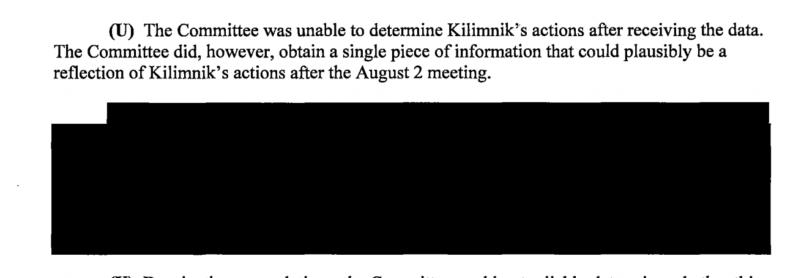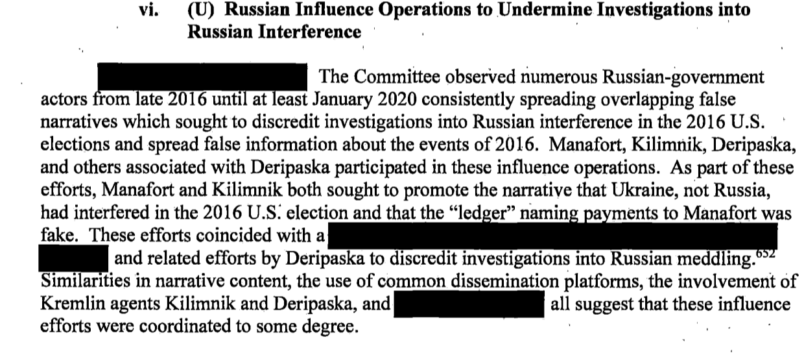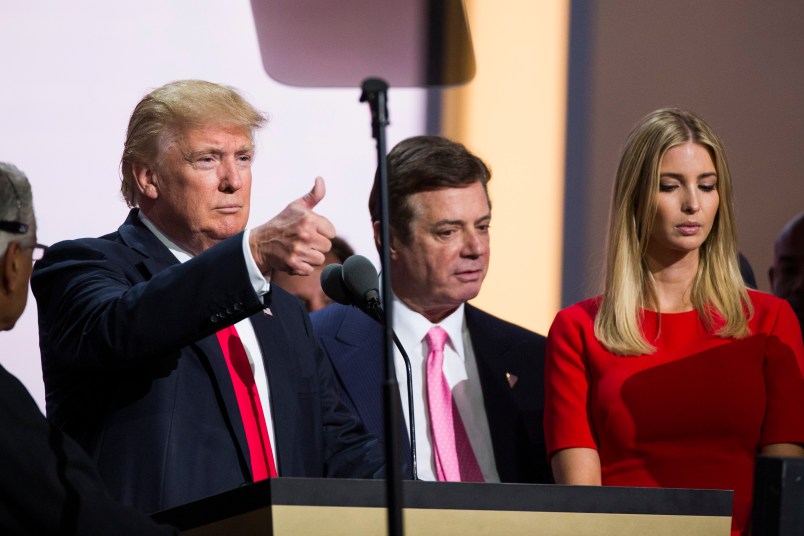“Fragmentary” evidence suggests that Trump campaign chairman Paul Manafort and a close associate of his may have had ties to Russia’s hacking of the 2016 Clinton campaign and the subsequent campaign to leak the stolen documents, a Republican-led Senate committee said on Tuesday.
The report, released by the Senate Intelligence Committee, identifies Manafort associate Konstantin Kilimnik as a “Russian intelligence officer” who “may have been connected to the GRU’s hack and leak operation.” Manafort, by the same token, had a “potential connection” to the same operation.
But the nearly 1,000 page bipartisan investigation documents in detail how Kilimnik went from exiting the Russian military as a lieutenant in 1995 to suggesting U.S. government appointments after the wake of the 2016 election, with Manafort at his side the whole way.
The report portrays Manafort as, at best, willfully ignorant of what was going on around him. But, as time goes on, Manafort is depicted by the report as becoming more and more reliant on cash flow from pro-Russian oligarchs in Ukraine and from Russian oligarch Oleg Deripaska, who the report describes as a factotum of the Russian government.
By early 2016, saddled with debts to some of those same oligarchs and with ample incentive to induce others to pay more, Manafort purportedly told his associate Rick Gates that “working for the Trump Campaign would be ‘good for business’” and a way to “be paid for work done in Ukraine for which they were owed.”
‘Fragmentary’
Bipartisan Senate investigators said in the report that “fragmentary” evidence supports the conclusion that Kilimnik served as “a channel for coordination on the GRU hack-and-leak operation.”
The GRU is the Russian military intelligence agency responsible for hacking the Clinton campaign and releasing a trove of internal documents through Wikileaks in 2016.
But bipartisan Senate investigators come close to suggesting that the highest levels of the Trump campaign had a ready way to coordinate with the GRU in Kilimnik.
The section discussing supporting evidence is heavily redacted, though it comes with a few telling clues placing Kilimnik near at least one high-level leak of internal U.S. government communications.
The report devotes significant space to discussing internal Trump polling data that Manafort offered to Deripaska and his Ukrainian oligarch clients during the summer of 2016.
Kilimnik, the report notes, expressed great interest in what the data suggested. The GOP-led probe concluded that the Russian intelligence officer “understood that some of the polling data showed that Clinton’s negatives were particularly high; that Manafort’s plan for victory called for focusing on Clinton’s negatives as much as possible; and that given Clinton’s high negatives, there was a chance that Trump could win.”
Later on, the report says, Kilimnik told an associate that he understood Trump’s victory chances to rely on a crucial factor: casting Clinton in as negative a light as possible.
It’s not clear what Kilimnik did with the data itself. The investigation was able to find one instance, but the section is entirely redacted:

As to Manafort, investigators concluded only that the extent of his “involvement with the GRU hack-and-leak operation is largely unknown.”
“Kilimnik was in sustained contact with Manafort before, during, and after the GRU cyber and influence operations, but the Committee did not obtain reliable, direct evidence that Kilimnik and Manafort discussed the GRU hack-and-leak operation,” investigators wrote.
The report leaves open key questions around what exactly may have transpired between Manafort, Kilimnik, and the GRU. It notes that Manafort’s and Kilimnik’s efforts to cover their tracks via encrypted communications were largely successful, allowing much of their written correspondence to disappear.
Specifically, the report says, those efforts obscured the answer to a key question: Kilimnik’s communications with Manafort during the Trump campaign.
Manafort, investigators note, was also willing to risk further jail time by lying to the Mueller investigation about his interactions with Kilimnik even after taking a plea agreement.
Manafort’s “true motive” in lying to Mueller is unknown, Senate investigators conclude, but “the result is that many interactions between Manafort and Kilimnik remain hidden.”
Onwards to impeachment
According to the report, the Russian active measures campaign never stopped.
Rather, it was confronted with its next step: countering investigations into its own role in then 2016 election, and propagating narratives to offer alternative explanations that differed from what really happened.
Investigators concluded that Manafort participated in the effort, which was spearheaded by “numerous Russian-government actors,” and that the campaign was “coordinated to some degree.”

Senate investigators concluded that the efforts “took place in the larger context of existing Russian information operations targeting Ukraine and the United States.”
For Manafort, the aim was characteristically alloyed with an extremely personal goal: to discredit the allegations that brought him down as campaign chairman in August 2016, emanating from an alleged bribe ledger in Ukraine showing his signature next to millions of dollars in allotments.
In Manafort’s telling, the leak of the bribe ledger marked an attack on him from the Ukrainian government — one instigated by the Obama administration and the Clinton campaign. TPM reported in December 2019 that much of the resulting narrative grew into the Ukraine-related allegations that led to President Trump’s impeachment last year.
The report describes how one of Manafort’s Ukrainian clients told him that the U.S. Embassy had pressured Ukrainian law enforcement to investigate him, and how Kilimnik quickly began to spread the information to journalists.
But in 2017, the report says, Manafort continued at a higher level. In February of that year, he emailed Donald Trump Jr. a copy of a Politico article that served as the basis for much of the counternarratives around Ukrainian interference in the election.
Throughout that year, the bipartisan report says, some of the same GRU actors responsible for interfering in 2016 began to say that Ukraine was the real culprit. In July 2017, a GRU account called Cyber Berkut claimed to have hacked emails showing support for the Clinton campaign from a Ukrainian oligarch.
During that year, Kilimnik also began reaching out to Yuriy Lutsenko, the report says, a Ukrainian politician who would later peddle false, damaging information about the U.S. Embassy in Kyiv and Joe Biden to the Trump administration.
Much of the section is redacted, but the public section cites a series of articles published by John Solomon in The Hill, which served as the basis for allegations that Trump attempted to blackmail Ukraine into investigating, withholding military aid until the probes commenced.
The other character that appears opaquely amid the extensive redactions is another Ukrainian who has been pushing allegations that his country interfered in the 2016 election: Andrii Telizhenko, the sole foreigner who Sen. Ron Johnson (R-WI) admits to have taken information from as part of his ongoing investigation into Joe Biden.
Telizhenko, the committee notes, has claimed that the bribe ledger that led to Manafort’s resignation was a “forgery.”
The rest of the section in which he is mentioned is redacted.







I’m thinking “close” means “working with.” Had yearly counter-intel briefings on my job for 35 years and there’s so many alarm bells here. Though us mere mortals need to follow the law. And please don’t get me started on OCI mitigation plans, etc. That’s for just us losers, too.
The Party of Putin is sad.
Besides Trump, how many Republicans are Putin puppets?
Will the NRA except more donations from Russia?
Where is Mitch?
I’ll be very surprised if he does. You’re a designated fall guy, Paul.
Anyone out there still believe its not the crime but the cover-up that gets you in the shit?
Cover-ups can work just fine, thank you very much.